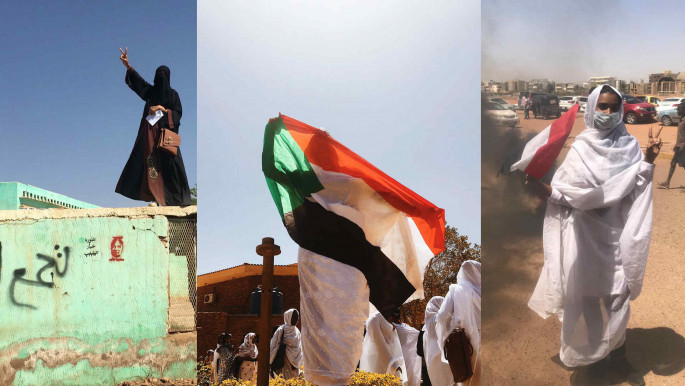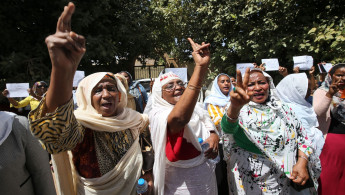'There is a war on women in Sudan': Women demand protection against violence and harassment
More than 50 local organisations participated in the march, with women and girls from different classes, ethnic groups and backgrounds.
Some wore trousers, others were in hijabs but they all had one message for women in their country: "You are strong!"
Protesting in front of the Ministry of Justice while marching towards the Ministry of Interior and the General Prosecution office in Khartoum, women carried banners with messages like 'The harasser is a weak dog,' and 'the political is personal and the personal is political.'
The protests followed an online campaign where women and girls shared their experiences of domestic violence and sexual harassment. It came after 13-year- old girl Samah el-Hadi was killed by her father for wanting to go to a private school in Omdurman, the twin city of Khartoum.
No arrests were initially made, and the family were allowed to bury her, but a week later following an outcry by thousands of people on social media, the police arrested her father for murder and re-examined her body.
"We believe that there is a war on women in Sudan now," said Yosra Akasha, the Sudan programme coordinator at the SIHA (Strategic Initiative for Women in the Horn of Africa) network, and one of the organisers of the protest.
"This war is reinforced by the lack of protection for women and the violence that they endure not only on the streets, but also in their own homes, like Samah did," she added.
"The government has an obligation to end all forms of discrimination, but we are still governed by the same laws during Bashir's era and the current government has not since ratified the conventions that protect women's rights."
 |
The government has an obligation to end all forms of discrimination, but we are still governed by the same laws during Bashir's era and the current government has not since ratified the conventions that protect women's rights |  |
Even while peacefully protesting for their rights on the streets of Sudan, women were not safe. During the 'feminist parade' march, one woman deliberately hit by a car being driven by a man who was against the protest, while a number of other women were sexually harassed, with one even threatened to be raped publicly.
"We have witnessed the culture of impunity that's so embedded in the Sudanese culture," Akasha vocalised.
Following Samah's murder, hundreds of women took to social media to share their own experiences of domestic violence and violence on the streets under the hashtag 'Nihna Maki', meaning 'We are with you.'
Read also: Sudanese women detained and sexually harassed while protesting for change
Some talked about their male guardians preventing them from wearing what they wanted to, while others commented on not being able to participate in the 2019 protests that led to the fall of former president Omar el-Bashir.
But this open forum of discussion was met with a backlash and a man launched a campaign calling for women to be flogged for 'wearing indecent clothes when out on the streets.' The online campaign also encouraged other men to join him.
"I participated in this protest because of the everyday threat and danger to my very existence," said 21-year-old law student at University of Khartoum Lubna Muntasir.
 |
|
| Read also: 'Fighting for our stolen rights': Sudanese women call for social justice revolution |
"My safety in my own country is now under threat and female victims of the patriarchy are increasing everyday."
Muntasir, along with eight other women filed a case against the man who called for flogging women on the streets for their appearances.
"We heard that he wants to travel so we filed an application to ban him from leaving the country before the trial," she told The New Arab.
Sudan does not have a law against domestic violence and about 57 percent of Sudanese families have witnessed domestic violence, according to the Arabic Barometers.
Although the country did change some laws last year that were considered to be against women and girls rights, the head of the police unit in Khartoum later demanded that they be restored, which sparked an outcry.
"What is going on now shows that women are no longer afraid," said Mias Saif, a human rights investigator and a women's right activist who has worked with a number of NGOs.
"Following the revolution and because of the social media, many women can now express themselves."
The controversial family law, which is based on Sharia law – which was introduced into the country in 1983 by former president Gaafar Nimeiry – has not been amended, even after changes were made to other laws deemed to be derogatory and humiliating for women and girls.
"The government needs to put an end to the fundamentalists' thoughts that are widespread in the country at the moment, and that specifically target women in public and private spheres," Akasha concluded.
Zeinab Mohammed Salih is a freelance reporter based in Khartoum and a member of The Marie Colvin Journalists' Network.
Follow her on Twitter: @ZeinabMSalih



